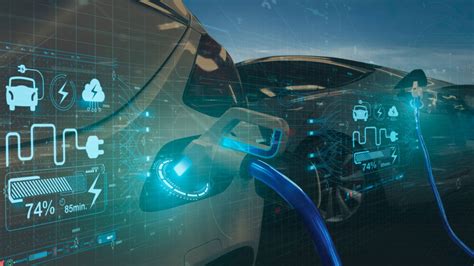As the world shifts towards a more sustainable and environmentally friendly future, electric vehicle (EV) technology has become a crucial component of this transition. The benefits of EVs, including reduced greenhouse gas emissions, lower operating costs, and improved performance, have made them an attractive option for consumers and governments alike. In this article, we will delve into the latest innovations and future developments in EV technology, exploring the advancements that are driving the industry forward.
Advancements in Battery Technology
One of the most significant challenges facing the EV industry is the development of efficient and cost-effective battery technology. Recent breakthroughs in battery research have led to the creation of more advanced battery chemistries, such as lithium-ion batteries with higher energy density and longer lifetimes. These advancements have enabled EV manufacturers to produce vehicles with longer ranges and faster charging times.

For example, the latest generation of lithium-ion batteries uses a new type of cathode material that increases energy density by up to 20%. This means that EVs can travel farther on a single charge, reducing the need for frequent recharging. Additionally, solid-state batteries, which replace the liquid electrolyte with a solid material, are being developed to improve safety and energy density.
Solid-State Batteries: The Future of EV Technology
Solid-state batteries are considered the holy grail of EV technology, offering the potential for significant improvements in energy density, safety, and charging times. By replacing the liquid electrolyte with a solid material, solid-state batteries can reduce the risk of thermal runaway and improve overall safety. Additionally, solid-state batteries can charge faster and have higher energy density, enabling EVs to travel longer distances on a single charge.

Several companies, including Volkswagen and BMW, are investing heavily in solid-state battery research and development. While significant technical challenges remain, solid-state batteries have the potential to revolutionize the EV industry and make electric vehicles more appealing to a wider range of consumers.
Advancements in Charging Technology
As the adoption of EVs continues to grow, the need for efficient and convenient charging technology has become increasingly important. Recent advancements in charging technology have led to the development of faster and more efficient charging systems, enabling EV owners to recharge their vehicles quickly and easily.

For example, the latest generation of DC fast-charging systems can recharge an EV's battery to 80% in under 30 minutes. This makes long-distance travel in an EV more practical and convenient, reducing range anxiety and making EVs more appealing to consumers.
Wireless Charging: The Future of EV Charging
Wireless charging technology has the potential to revolutionize the way we charge our EVs. By eliminating the need for a physical charging cable, wireless charging systems can make charging more convenient and efficient. Additionally, wireless charging can reduce wear and tear on charging cables and connectors, improving overall reliability and safety.

Several companies, including WiTricity and Qualcomm, are developing wireless charging systems for EVs. While significant technical challenges remain, wireless charging has the potential to make EV ownership more convenient and appealing to a wider range of consumers.
Autonomous Vehicle Technology
Autonomous vehicle (AV) technology has the potential to revolutionize the way we travel, reducing accidents and improving overall safety. Recent advancements in AV technology have led to the development of more advanced sensor systems and machine learning algorithms, enabling vehicles to navigate complex environments and make decisions in real-time.

For example, the latest generation of AV systems uses a combination of cameras, lidar, and radar sensors to detect and respond to their environment. Additionally, advanced machine learning algorithms enable vehicles to learn from experience and adapt to new situations, improving overall safety and reliability.
AV Technology in EVs: A Perfect Combination
The combination of AV technology and EVs has the potential to create a new paradigm in transportation. By enabling vehicles to navigate complex environments and make decisions in real-time, AV technology can reduce accidents and improve overall safety. Additionally, the electric powertrain of an EV provides a smooth and quiet ride, making it an ideal platform for AV technology.

Several companies, including Waymo and Tesla, are developing AV technology for EVs. While significant technical challenges remain, the combination of AV technology and EVs has the potential to revolutionize the way we travel and make transportation safer and more efficient.
Future Developments in EV Technology
As the EV industry continues to evolve, we can expect to see significant advancements in technology and innovation. Some of the future developments that we can expect to see include:
- Improved battery technology, including solid-state batteries and new battery chemistries
- Advancements in charging technology, including faster and more efficient charging systems
- Increased adoption of autonomous vehicle technology, enabling vehicles to navigate complex environments and make decisions in real-time
- Improved safety features, including advanced sensor systems and machine learning algorithms
- Increased focus on sustainability, including the use of recycled materials and reduced waste

As the EV industry continues to evolve, we can expect to see significant advancements in technology and innovation. By staying up-to-date with the latest developments and innovations, consumers and manufacturers can make informed decisions about the future of transportation.






What is the current state of electric vehicle technology?
+The current state of electric vehicle technology is rapidly evolving, with significant advancements in battery technology, charging systems, and autonomous vehicle technology.
What are the benefits of electric vehicles?
+The benefits of electric vehicles include reduced greenhouse gas emissions, lower operating costs, and improved performance.
What is the future of electric vehicle technology?
+The future of electric vehicle technology is expected to include significant advancements in battery technology, charging systems, and autonomous vehicle technology, making electric vehicles more appealing to a wider range of consumers.
As we conclude our exploration of electric vehicle technology, we invite you to share your thoughts and opinions on the future of transportation. How do you think EV technology will evolve in the coming years? What innovations do you think will have the greatest impact on the industry? Share your comments below and join the conversation!
